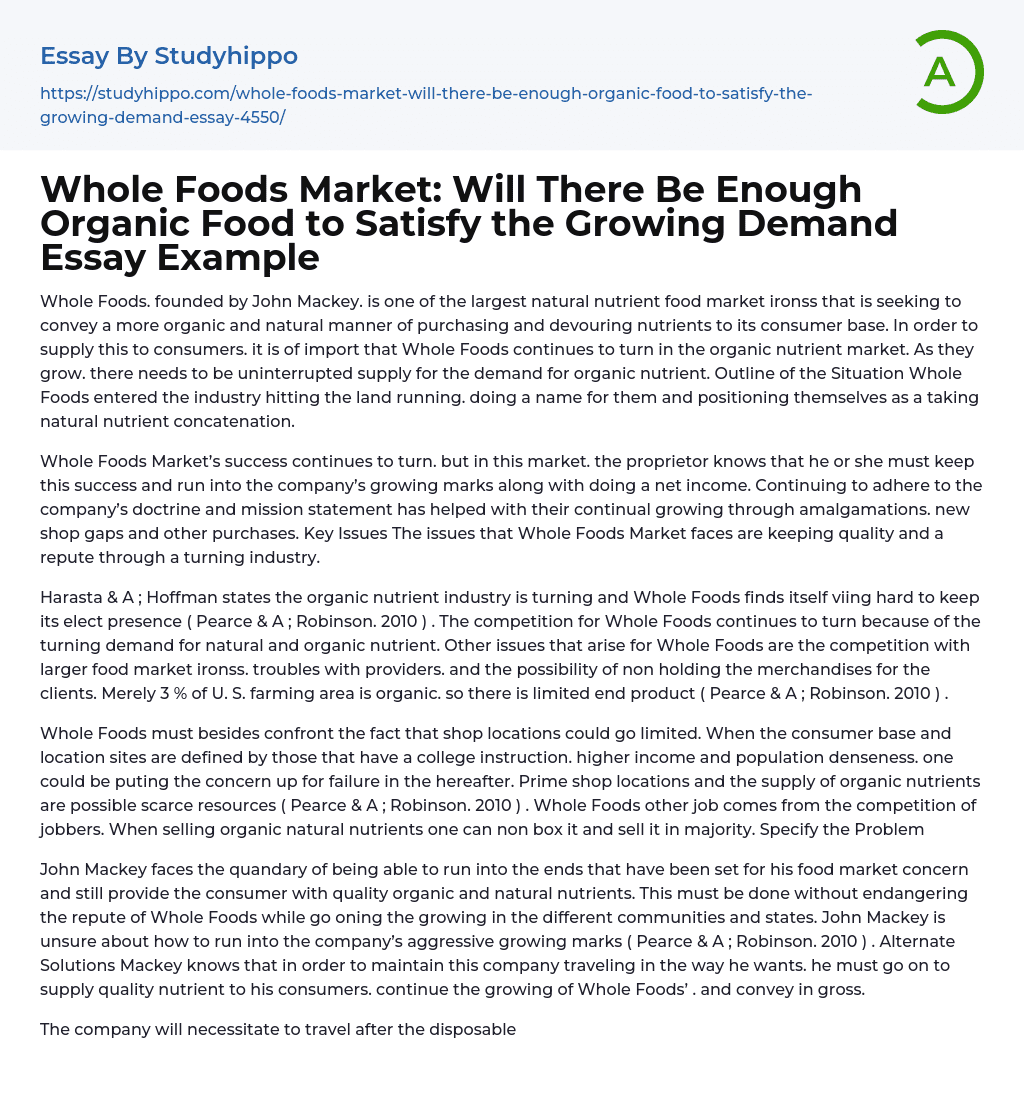

Whole Foods Market: Will There Be Enough Organic Food to Satisfy the Growing Demand Essay Example
Whole Foods, founded by John Mackey, is a renowned chain of natural and nutrient-rich food markets that focuses on providing an organic and natural approach to purchasing and consuming food. To remain competitive in the organic food market and meet consumer demands, Whole Foods must ensure a consistent supply of organic food. Despite facing competition and difficulties, Whole Foods has successfully established itself as a leading chain for natural foods through mergers, new store openings, and acquisitions. However, maintaining quality and reputation in a constantly growing industry presents ongoing challenges for Whole Foods. The demand for natural and organic food is rising, resulting in increased competition within the organic food market. In addition to this intensified competition, Whole Foods also contends with larger grocery chains as well as struggles with suppliers. It should be noted tha
...t only 3% of farming land in the United States is dedicated to organic production, leading to limited availability of organic food (Pearce & Robinson, 2010). Another challenge faced by Whole Foods relates to potential limitations when choosing store locations due to their customer base being defined by higher education levels, income levels, and population density. This could pose future risks for the company since prime store locations may become scarce alongside limited supplies of organic food (Pearce & Robinson, 2010).In addition, wholesaler-related issues pose a challenge for Whole Foods as they are unable to sell organic natural food products in bulk quantities (Pearce & Robinson ,2010). John Mackey faces the task of finding a solution that allows his grocery business, Whole Foods, to achieve its goals of offering consumers quality organic and natural food while maintaining their reputation and
expanding across various communities and states. Pearce & Robinson (2010) state that Mackey is uncertain about how to meet the company's ambitious growth targets. To tackle this challenge, Mackey recognizes the significance of continuing to provide customers with high-quality food in order to ensure the growth and revenue generation of Whole Foods. The company's strategy involves targeting local communities who share their mission and vision by focusing on regions where individuals have disposable income. This disposable income comes from baby boomers, urban singles, and working women who prioritize a healthy diet even if it means paying more due to their health-consciousness and affordability. In order for Whole Foods to address these needs effectively, they must maintain their leadership position within the industry. By doing so, they will experience increased growth and successfully reach their goal of generating $12 billion in revenue. While controlling the supply of organic food from suppliers is beyond their control, they can guarantee exceptional service and quality for their customers as well as provide an excellent work environment for their staff members.Whole Foods' commitment to its mission allows for further expansion through mergers, acquisitions, or new locations, all while meeting the increasing demand for organic and natural food. The company employs selling tools in specific stores to boost sales of affordable organic products and attracts more customers through ongoing charitable efforts. By integrating acquired companies into their business strategy, Whole Foods supports growth, maintaining a revenue of $12 billion and operating over 300 stores. Additionally, by offering quality products and fostering a positive work environment, Whole Foods promotes customer loyalty and encourages individuals to bring others who share their preference for
organic and natural food options. Through consistent provision of high-quality products, Whole Foods has influenced consumers' eating habits and will continue expanding by remaining dedicated to its vision and mission.
- Bank essays
- Banking essays
- Corporate Finance essays
- Credit Card essays
- Currency essays
- Debt essays
- Donation essays
- Enron Scandal essays
- Equity essays
- Financial Accounting essays
- Financial Crisis essays
- Financial News essays
- Financial Ratios essays
- Financial Services essays
- Forecasting essays
- Foreign Exchange Market essays
- Free Market essays
- Gold essays
- Investment essays
- Legacy essays
- Loan essays
- Market Segmentation essays
- Money essays
- Personal finance essays
- Purchasing essays
- Retirement essays
- Shareholder essays
- Stock Market essays
- Supply And Demand essays
- Venture Capital essays
- Beef essays
- Beer essays
- Beverages essays
- Bread essays
- Burger essays
- Cake essays
- Coconut essays
- Coffee essays
- Cooking essays
- Crowd essays
- Cuisines essays
- Dairy essays
- Desserts essays
- Dinner essays
- Drink essays
- Fast Food essays
- Favorite Food essays
- Food Safety essays
- Food Security essays
- Food Waste essays



